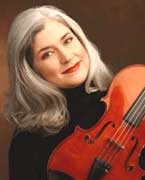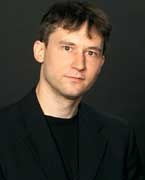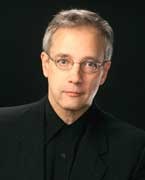New Music for Violin and Viola
featuring
Christine Rutledge, viola
Wolfgang David, violin
David Gompper, piano
with the CNM Ensemble
performing works by
Baker, Davidovsky, Gompper and Miklós Rózsa
Sunday, February 8, 2009, 2:00 p.m.
at Old Capitol Senate Chamber
|| download program ||
Program
| Duo in G major, for violin and viola (K. 423) I. Allegro II. Adagio III. Rondo. Allegro |
Wolfgang Amadeus MOZART (1756-1791) |
|
| Three Phantasy Pieces for viola and percussion (2005/2005) I. J.B. (Johannes Brahms) II. R.S. (Robert Schumann) III. H.B. (Hector Berlioz) |
Claude BAKER (b. 1948) |
|
| Christine Rutledge, viola Ginny Armstrong and Meghan Aube, percussion David Gompper, conductor |
||
| Intermission | ||
| Duo Capriccioso for violin and piano (2003) | Mario DAVIDOVSKY (b. 1934) |
|
| Introduction and Allegro for solo viola, op. 44 (1988) | Miklós RÓZSA (1907-1995) |
|
| Spirals for violin, viola and string ensemble (2007) | David GOMPPER (b. 1954) |
|
| Emily Rolka, Anna Draper, Cameo Jong, Colleen Ferguson, violins Jessica Altfillisch, viola Parker Stanley, violoncello Volkan Orhon, double bass David Gompper, conductor |
Performers

Violist Christine Rutledge has appeared as soloist, chamber musician, and orchestral musician throughout the United States and abroad. Her performances and recordings have been praised in such publications as The Strad, Fanfare, The New York Times, and The New York Concert Review. Recent solo performances and master classes include those at four International Viola Congresses in the US, Germany, and Sweden; the University of Michigan; the Oberlin Conservatory; Arizona State University; the University of Arizona; the University of Northern Arizona; the University of Kansas; and Bowling Green State University.
Rutledge's repertoire spans major works from the standard repertory to lesser-known and obscure works for the viola, particularly those for viola in unusual combinations. She also performs many of her original transcriptions of Baroque compositions on both modern and Baroque viola, including the Bach Cello Suites and Sonatas for viola da gamba. During the 2002-03 concert season she performed these complete works as a four-recital cycle. As a champion of new works she has commissioned many new compositions including Chimera for Viola and Harpsichord by C.P. First, Nudged Along on Time's Notched Stick for Flute, Viola, and Guitar by Zae Munn, and Hamadryad for alto flute, viola, and guitar by Jeremy Dale Roberts.
Currently Rutledge holds the position of associate professor of viola at The University of Iowa. She serves on the executive board of the American Viola Society, and is president of the Iowa Viola Society. For six years she served as Assistant Principal Viola of the Louisville Orchestra and violist of the Ceruti Chamber Players and the Kentucky Center Chamber Players. She has also been a member of the faculty at the University of Notre Dame. Festival appearances include the Roycroft Music Festival, the Sewanee Summer Music Center, "Brunch with Bach" series at the Detroit Institute of Art, the Manitou Music Festival, the Hot Springs Music Festival, the Interlochen Center for the Arts, and the Fontana Chamber Arts Festival.
Rutledge is a graduate of the Curtis Institute of Music as a student of Karen Tuttle and Michael Tree, and The University of Iowa with William Preucil, Sr. She is also a graduate of the Interlochen Arts Academy, where she was honored as Valedictorian and recipient of a Young Artist Award. Among her many honors are Prizewinner in the Aspen Festival Viola Competition, an Indiana Arts Commission Individual Artist's Fellowship, recipient of an Eli Lilly Foundation grant for undergraduate teaching development, as well as several awards from the Institute for Scholarship in the Liberal Arts at the University of Notre Dame and the Arts and Humanities Initiative at The University of Iowa.

In the space of a few short years, Wolfgang David has ensconced himself on the international stage, both as a recitalist, and as a guest soloist with many of the world's leading orchestras, such as the Royal Philharmonic Orchestra, Vienna Radio Symphony Orchestra, Johannesburg Philharmonic Orchestra, Berne Symphony Orchestra, New York Virtuosi etc. He has been well received by the press--the Washington Post writes that he has "scaled the heights of music-making," while The Strad praises his playing for being as "emotionally wide-ranging as one could hope for," and Thomas Frost, Senior Executive Producer at SONY Classical, foresees for him "a significant international concert and recording career."
Admitted to the University for Music in Vienna at the age of eight, David studied there for many years with Rainer Kuechl, the concertmaster of the Vienna Philharmonic Orchestra. He subsequently continued his studies at the Musikhochschule in Cologne with Igor Ozim, and at the Guildhall School of Music in London with Yfrah Neaman.
The winner of many competitions and prizes, David has performed in major halls such as Konzerthaus and Musikverein Hall in Vienna, Carnegie Hall in New York, Cerritos Center in Los Angeles, the Wigmore Hall in London, and Philharmonie in Cologne. He has concertized in over 30 countries and tours regularly throughout Europe, the United States, South Africa, and South Korea. In 2006 David recorded an album of compositions by the King of Thailand Bhumibol Adulyadej with the Royal Philharmonic Orchestra (London) under the baton of Emmanuel Siffert.
Highlights of his career have included concerts at the Great Assembly Hall of the United Nations in New York in the presence of Secretary General Kofi Annan, and a concert in Bangkok, given for the Queen of Thailand.
Wolfgang David performs on a violin built in 1715 by Carlo Bergonzi, Cremona, on exclusive loan to him from the Austrian National Bank. Wolfgang David has recorded a CD with the Royal Philharmonic Orchestra under the baton of Emmanuel Siffert and two albums with the American pianist David Gompper.

David Gompper has lived and worked professionally as a pianist, a conductor, and a composer in New York, San Diego, London, Nigeria, Michigan, Texas and Iowa. He studied at the Royal College of Music in London with Jeremy Dale Roberts, Humphrey Searle and Phyllis Sellick. After teaching in Nigeria, he received his doctorate at the University of Michigan, taught at the University of Texas, Arlington, and since 1991 has been Professor of Composition and Director of the Center for New Music at the University of Iowa. In 2002 - 2003 Gompper was in Russia as a Fulbright Scholar, teaching, performing and conducting at the Moscow Conservatory.
Gompper's compositions are heard throughout the United States and Europe. In 1999 his Transitus (for wind ensemble) premiered at Carnegie Hall, and a number of his works have premiered in London's Wigmore Hall, including: Hommage a W. A. (William Albright) for piano; and Shades of Love, a song cycle on the poetry of Constantin Cavafy. The Slovac Radio Orchestra will record Gompper's Violin Concerto later this fall.
Subsequent returns to Moscow have included premieres and performances of Crossed (November 2003); Music in the Glen and Six Love Poems (November 2004); Star of the County Down (November 2005, and in May 2006; Albany Records TROY937); and Butterfly Dance (Albany Records TROY882). His Outside Cage for piano and electronics was premiered at the Institute of Music and Acoustics in Karlsruhe, Germany this past June. Gompper's An Elm We Lost and Kuta Muela appear on the CD Monsterology (Albany Records TROY900), as well as Musica segreta (Albany Records, TROY956).
Notes & Bios
Wolfgang Amadeus MOZART
Duo in G major, for violin and viola
In all likelihood this duo was composed during Mozart's visit to Salzburg in 1783. According to a biographical sketch of Michael Haydn published in 1808, K423 and 424 were occasioned by an illness which prevented Mozart's older friend and colleague from completing a set of 6 duos requested by the Archbishop.
Claude BAKER
Three Phantasy Pieces for viola and percussion
was commissioned by the Center for New Music at the University of Iowa for Christine Rutledge and Daniel Moore. Each movement draws its inspiration in turn from three well-known compositions for viola. The first piece in the set makes oblique reference to the second movement of the Sonata Op. 120, No. 1 for viola and piano by Johannes Brahms. The next uses as its structural (and motivic) basis the second "Märchenbild" of Robert Schumann and provides a light-hearted foil for the more somber outer movements.
The final piece is a parody of the "Procession of the Pilgrims" from Hector Berlioz's Harold in Italy and is, in essence, a chaconne (a musical form based on the continuous variation of a series of chords). The gradual unfolding and intensification of the chaconne pattern in both the viola and vibraphone is interrupted at the movement's climax with a modified quotation of the "Canto Religioso" from Berlioz's work. Claude Baker
Claude Baker (b. 1948) attained his doctoral degree from the Eastman School of Music, where his principal composition teachers were Samuel Adler and Warren Benson. As a composer, Mr. Baker has received a number of professional honors, including an Academy Award in Music from the American Academy of Arts and Letters; two Kennedy Center Friedheim Awards; a "Manuel de Falla" Prize (Madrid); the Eastman-Leonard and George Eastman Prizes; the inaugural "Barto Prize"; BMI-SCA and ASCAP awards; commissions from the Barlow, Fromm and Koussevitzky Music Foundations; and fellowships from the John Simon Guggenheim Memorial Foundation, the National Endowment for the Arts, the Rockefeller Foundation, the Bogliasco Foundation and the state arts councils of Indiana, Kentucky and New York. During the 2008-09 academic year, he was the Paul Fromm Composer-in-Residence at the American Academy in Rome.
Among the many orchestras that have performed his music are those of Saint Louis, San Francisco, Atlanta, Pittsburgh, Indianapolis and Louisville, as well as the New York Philharmonic, the National Symphony Orchestra, the Orquesta Sinfonica de RTV Espanola, the Orquesta Nacional de Espana and the Musikkollegium Winterthur. Other ensembles include the Cleveland Chamber Symphony, the Esprit Orchestra, the Aeolian Chamber Players, the Left Coast Chamber Ensemble and the Pacifica String Quartet (with pianist Ursula Oppens). His works are published by MMB Music and Carl Fischer, and are recorded on the ACA, Gasparo, TNC and Louisville First Edition labels.
Mr. Baker has served on the faculties of the University of Georgia and the University of Louisville and has been a Visiting Professor at the Eastman School of Music. He is currently Class of 1956 Chancellor's Professor of Composition in the Jacobs School of Music at Indiana University, Bloomington. At the beginning of the 1991-92 concert season, he was appointed Composer-in-Residence of the Saint Louis Symphony Orchestra, a position he held for eight years. In recognition of his contributions to the St. Louis community during that period, Mr. Baker was awarded an honorary doctorate by the University of Missouri-St. Louis in 1999.
Mario DAVIDOVSKY
Duo Capriccioso
Davidovsky describes combining the violin with the piano in this recent composition as his attempt to make two totally different instruments work together acoustically without the benefit of the harmonic blending that would be automatic in tonal music. According to Davidovsky, the violin is by nature " a fly" and the piano "an elephant". To compose each moment within each phrase then he must find the pieces of sound that will "embed one instrument into the other".
One kind of counterpoint in Davidovsky's music thus consists of the simultaneity of a melodic/rhythmic idea and a timbre/dynamic idea (what Bulent Arel liked to call "timbre melody"). In the opening of the Duo Capriccioso, the timbre line consists of an opening midrange violin tremolo-like motive which, as it opens out, adds harmonics that create, at once, abrupt shifts in timbre and leaps in register. This violin music sets up the piano entrance by increasing the energy and focusing on the pitch "A". As the violin reaches the "A", the number of timbres explodes. The first A is a left-hand pizzicato. The next attack is a regular pizz., the next bowed, and finally, the same A is played as intensely as possible, tripled on three of the violin's four strings. With all of this timbral insistence on one pitch, the piano is able to sneak in softly, playing the very same A, as if it were simply part of the violin. As the music continues, the piano adds it share of mercurial changes in timbre, including notes "stopped" by touching and muting the piano strings and pizz, plucking inside the piano. Eric Chasalow
Born in 1934 in Medanos, Buenos Aires, Mario Davidovsky began his musical studies at the ago of seven, continued his education at the Collegium Musicium, and graduated from the Bartolome Mitre School in Buenos Aires in 1952.
He is a member of the American Academy of Arts and Letters, director of the Koussevitzky Foundation at the Library of Congress, director of the Fromm Foundation at Harvard University, director of C.R.I., and founder and vice president of the Robert Miller Fund for Music. Fellowships have included the Koussevitzky Foundation Fellowship, the Williams Foundation Fellowship, the Guggenheim Foundation Fellowship, the Rockefeller Foundation Fellowship, and the Walter Channing Cabot Fellowship. Davidovsky has received a Pulitzer Prize and awards from the Association Wagneriana, the Asociación Amigos de la Música, BMI, Brandeis University, and the National Institute of Arts.
Davidovsky has received numerous commissions, including those from the Fromm Foundation, the Juilliard String Quartet, the Koussevitzky Foundation, Yale University, the New York Chamber Soloists, Parnassus, the Universities of Pennsylvania and Chicago, the Philadelphia Orchestra, Speculum Musicae, the San Francisco Symphony, MIT, the Naumburg Foundation, the Dorian Quintet, the Emerson Quartet, the New Music Consort, Orpheus Chamber Orchestra, and others.
Davidovsky is the Fanny P. Mason Professor of Music, Emeritus, at Harvard University. He is the former Director of the Columbia/Princeton Electronic Music Center and MacDowell Professor of Music at Columbia University. He has served for 29 years as the Director of the Composers' Conference at Wellesley. He has held visiting professorships at the University of Michigan, Yale University, City University, the Di Tella Institute (Argentina), the Manhattan School of Music, and the University of Pennsylvania.
Miklós RÓZSA
Introduction and Allegro for solo viola
was composed for violist Tony Thomas in 1987-88. He also wrote a significant concerto for viola and orchestra, his op. 37, in 1982.
Composer Miklós Rózsa was born in Budapest in 1907. After early studies in violin, viola and piano, he moved to Leipzig to study composition with Hermann Grabner, a student of Max Reger. His earliest works include his string trio, op. 1 and his piano quintet, op. 2. In 1939 Rózsa moved to California to compose film scores, where he remained the rest of his life, composing over 100 film scores. He was nominated for 17 Academy Awards, and won the Oscar for his films "Spellbound," "A Double Life," and the best-known, "Ben-Hur."
David GOMPPER
Spirals for violin, viola and string ensemble
originally for two violins and string orchestra, Spirals is heard in today's recital in a version for violin, viola and small string ensemble. The composition uses a similar collection of "broken" fifths that served as the basis of the Violin Concerto. In this work, though, the Fibonacci series is applied to all musical parameters, including pitch distribution, density control and formal and micro-rhythmic structural formulations. The work is in one movement with distinct three sections (moderato, slow, fast).
David K. Gompper (b. 1954) works professionally as a pianist, a conductor, a composer, and a pedagogue. He studied at the Royal College of Music in London and at the University of Michigan, and has for the past 17 years been Professor of Composition and Director of the Center for New Music at the University of Iowa. Gompper's compositions are performed widely, with several receiving their premier in London's Wigmore Hall, others at the Moscow Conservatory and at the ZKM Institute for Music and Acoustics in Karlsruhe, Germany. L'Icone St. Nicolas will be premiered in New York City (Merkin, Feb. 17) and Harvard (Fromm Concert Series Feb. 20) by the Manhattan Sinfonietta. Echoes and Ikon, his latest works for violin and piano, were taken on tours in 2007 and 2008 respectively throughout the United States, Canada and Europe with Wolfgang David, a violinist from Vienna with whom Gompper actively collaborates as a pianist and composer. Gompper's Violin Concerto, together with other of his orchestral works, will be recorded by the Royal Philharmonic Orchestra (London) in December of 2009 for release on the Naxos label in early 2011. Gompper is also recorded on the Capstone, the Centaur, and the Albany labels.